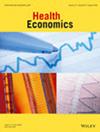Children's Education and Parental Healthcare Utilization: The Roles of Knowledge Transfer and Financial Support
Abstract
Healthcare utilization among older people in developing countries is typically far below the level considered adequate in developed countries. This study investigates the effect of children's education on parental healthcare utilization in China. We exploit the change in children's education induced by the Compulsory Education Law (CEL) reform around 1986. We find that children's education reduces parents' outpatient care utilization, but increases their inpatient care utilization, self-treatment use, and dental care. These effects can partly be explained by knowledge transfer leading to an increasing knowledge of quality and price differentials between different treatments and awareness of chronic diseases—Indeed we also find that parents with higher-educated children are more likely to accurately report chronic diseases. Moreover, parents receive more monetary transfers from children and have more economic resources to afford health services if their children are better educated. In line with these mechanisms, we also find that children's education improves older parents' perceived chances to survive the next 10 years.

 求助内容:
求助内容: 应助结果提醒方式:
应助结果提醒方式:


